Accounting Information Systems and SME Performance in Spain
VerifiedAdded on 2020/07/22
|10
|2685
|129
Report
AI Summary
This report provides an analysis of the impact of Accounting Information Systems (AIS) on Small and Medium Enterprises (SMEs) in Spain. The study examines the relationship between the implementation of AIS and improvements in business performance and productivity. The background section highlights the significance of SMEs in the national economy and the growing importance of information technology. The research explores the positive correlation between AIS investment and business strategy, as well as the challenges faced by organizations in comprehending and utilizing IT systems effectively. The critique of the article assesses the methodology, focusing on the empirical study conducted on over six hundred SMEs in Spain, examining the impact of AIS on financial performance and productivity. The report also acknowledges the limitations of the study, such as the lack of extensive literature and sample bias, while suggesting avenues for future research. The conclusion emphasizes the positive impact of AIS on SME performance and its role in simplifying financial management processes.
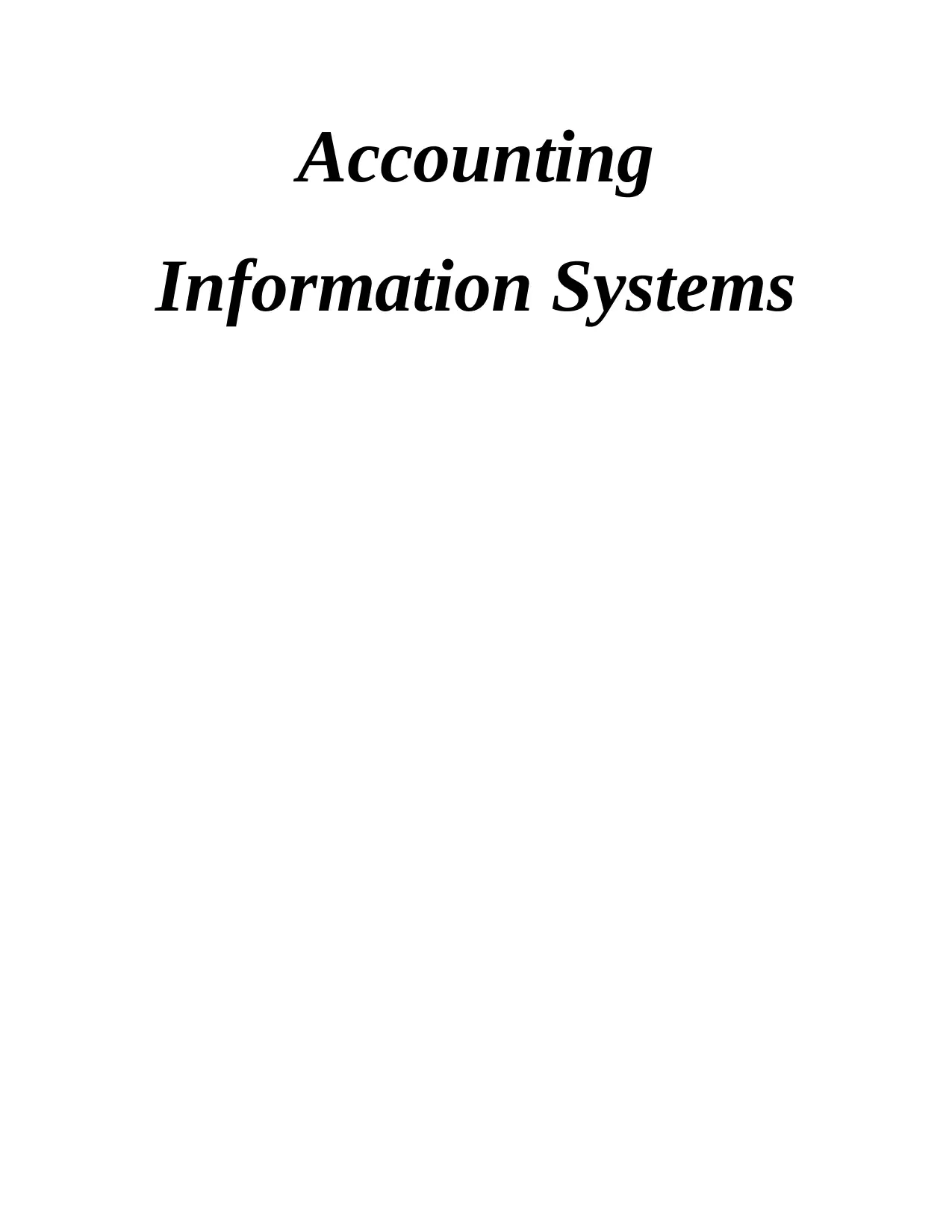
Accounting
Information Systems
Information Systems
Paraphrase This Document
Need a fresh take? Get an instant paraphrase of this document with our AI Paraphraser
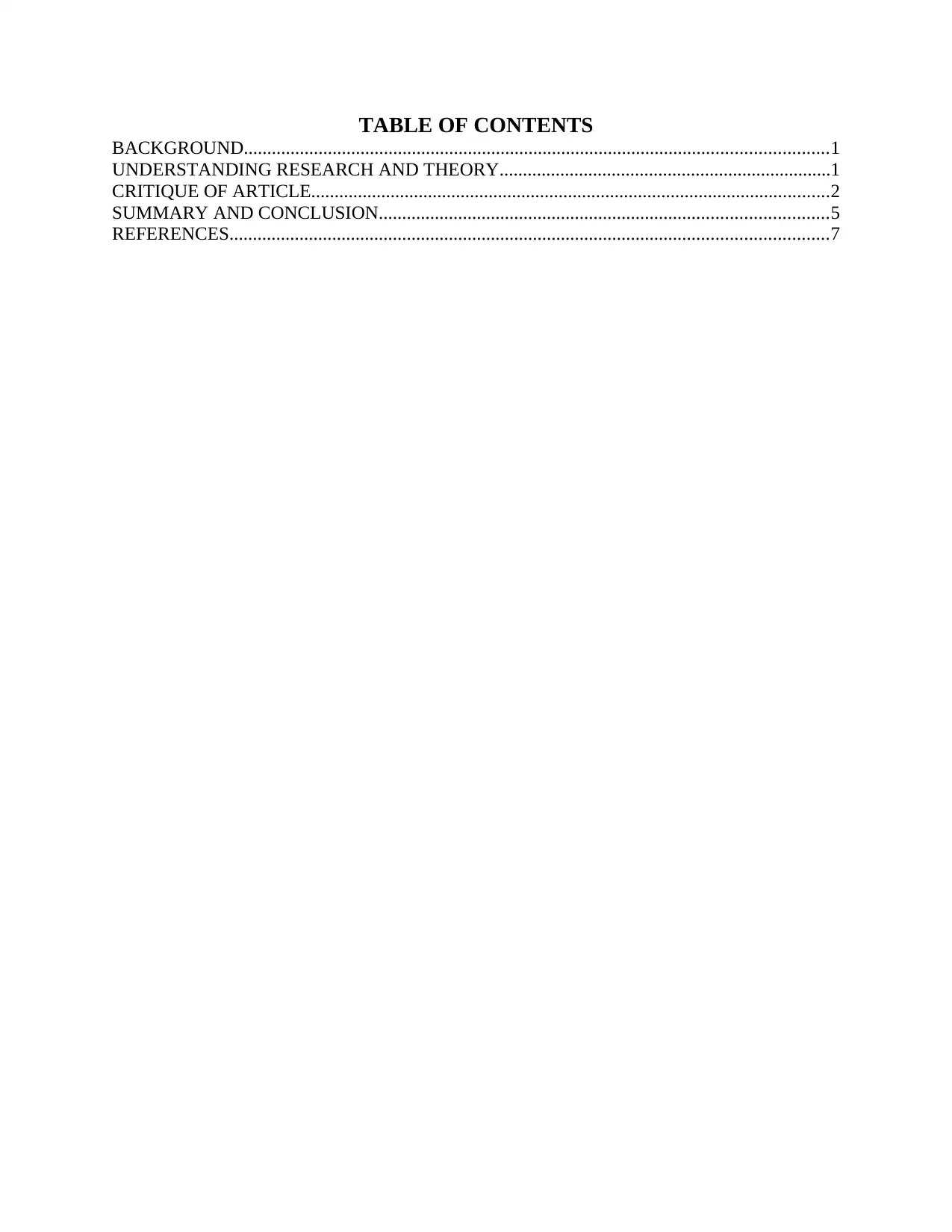
TABLE OF CONTENTS
BACKGROUND.............................................................................................................................1
UNDERSTANDING RESEARCH AND THEORY.......................................................................1
CRITIQUE OF ARTICLE...............................................................................................................2
SUMMARY AND CONCLUSION................................................................................................5
REFERENCES................................................................................................................................7
BACKGROUND.............................................................................................................................1
UNDERSTANDING RESEARCH AND THEORY.......................................................................1
CRITIQUE OF ARTICLE...............................................................................................................2
SUMMARY AND CONCLUSION................................................................................................5
REFERENCES................................................................................................................................7
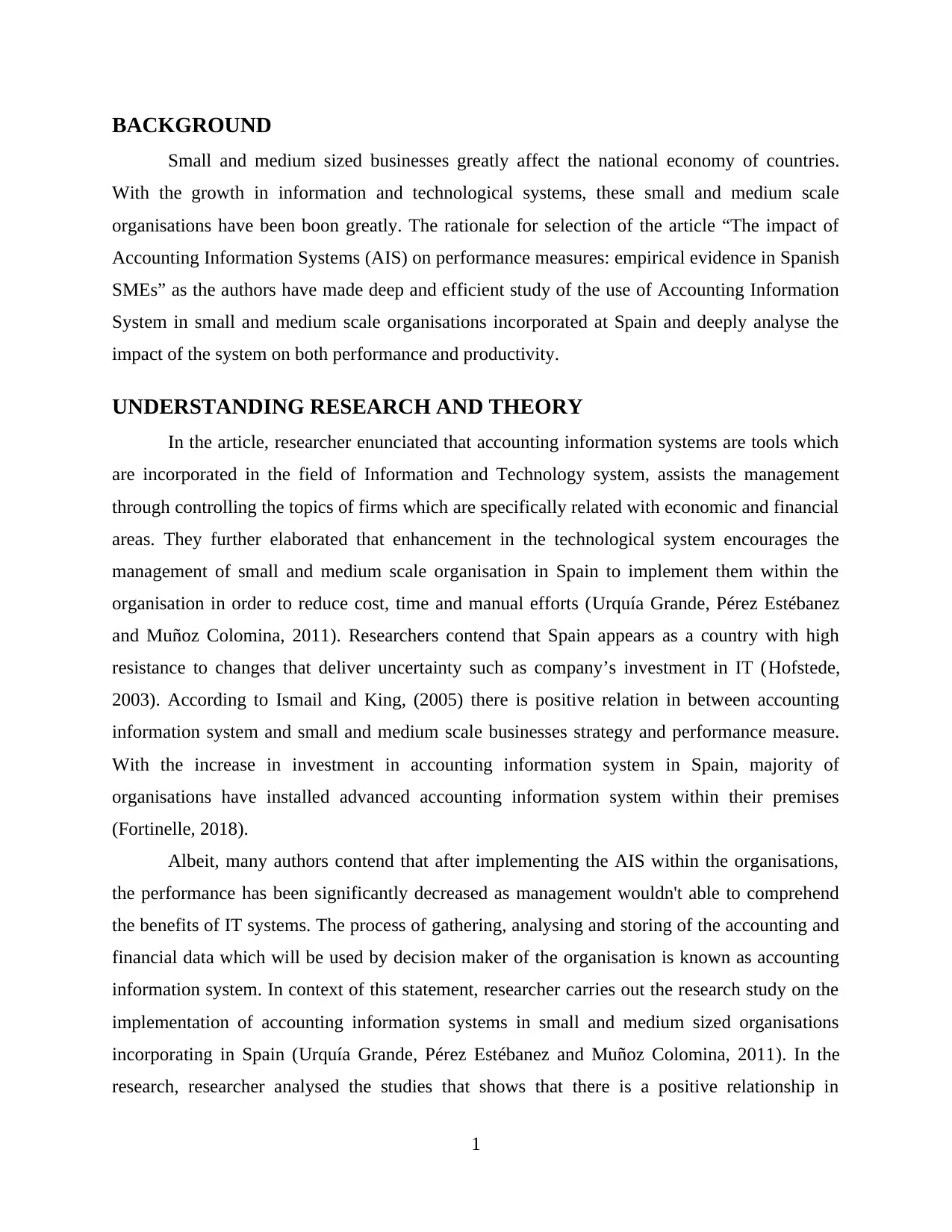
BACKGROUND
Small and medium sized businesses greatly affect the national economy of countries.
With the growth in information and technological systems, these small and medium scale
organisations have been boon greatly. The rationale for selection of the article “The impact of
Accounting Information Systems (AIS) on performance measures: empirical evidence in Spanish
SMEs” as the authors have made deep and efficient study of the use of Accounting Information
System in small and medium scale organisations incorporated at Spain and deeply analyse the
impact of the system on both performance and productivity.
UNDERSTANDING RESEARCH AND THEORY
In the article, researcher enunciated that accounting information systems are tools which
are incorporated in the field of Information and Technology system, assists the management
through controlling the topics of firms which are specifically related with economic and financial
areas. They further elaborated that enhancement in the technological system encourages the
management of small and medium scale organisation in Spain to implement them within the
organisation in order to reduce cost, time and manual efforts (Urquía Grande, Pérez Estébanez
and Muñoz Colomina, 2011). Researchers contend that Spain appears as a country with high
resistance to changes that deliver uncertainty such as company’s investment in IT (Hofstede,
2003). According to Ismail and King, (2005) there is positive relation in between accounting
information system and small and medium scale businesses strategy and performance measure.
With the increase in investment in accounting information system in Spain, majority of
organisations have installed advanced accounting information system within their premises
(Fortinelle, 2018).
Albeit, many authors contend that after implementing the AIS within the organisations,
the performance has been significantly decreased as management wouldn't able to comprehend
the benefits of IT systems. The process of gathering, analysing and storing of the accounting and
financial data which will be used by decision maker of the organisation is known as accounting
information system. In context of this statement, researcher carries out the research study on the
implementation of accounting information systems in small and medium sized organisations
incorporating in Spain (Urquía Grande, Pérez Estébanez and Muñoz Colomina, 2011). In the
research, researcher analysed the studies that shows that there is a positive relationship in
1
Small and medium sized businesses greatly affect the national economy of countries.
With the growth in information and technological systems, these small and medium scale
organisations have been boon greatly. The rationale for selection of the article “The impact of
Accounting Information Systems (AIS) on performance measures: empirical evidence in Spanish
SMEs” as the authors have made deep and efficient study of the use of Accounting Information
System in small and medium scale organisations incorporated at Spain and deeply analyse the
impact of the system on both performance and productivity.
UNDERSTANDING RESEARCH AND THEORY
In the article, researcher enunciated that accounting information systems are tools which
are incorporated in the field of Information and Technology system, assists the management
through controlling the topics of firms which are specifically related with economic and financial
areas. They further elaborated that enhancement in the technological system encourages the
management of small and medium scale organisation in Spain to implement them within the
organisation in order to reduce cost, time and manual efforts (Urquía Grande, Pérez Estébanez
and Muñoz Colomina, 2011). Researchers contend that Spain appears as a country with high
resistance to changes that deliver uncertainty such as company’s investment in IT (Hofstede,
2003). According to Ismail and King, (2005) there is positive relation in between accounting
information system and small and medium scale businesses strategy and performance measure.
With the increase in investment in accounting information system in Spain, majority of
organisations have installed advanced accounting information system within their premises
(Fortinelle, 2018).
Albeit, many authors contend that after implementing the AIS within the organisations,
the performance has been significantly decreased as management wouldn't able to comprehend
the benefits of IT systems. The process of gathering, analysing and storing of the accounting and
financial data which will be used by decision maker of the organisation is known as accounting
information system. In context of this statement, researcher carries out the research study on the
implementation of accounting information systems in small and medium sized organisations
incorporating in Spain (Urquía Grande, Pérez Estébanez and Muñoz Colomina, 2011). In the
research, researcher analysed the studies that shows that there is a positive relationship in
1
⊘ This is a preview!⊘
Do you want full access?
Subscribe today to unlock all pages.

Trusted by 1+ million students worldwide
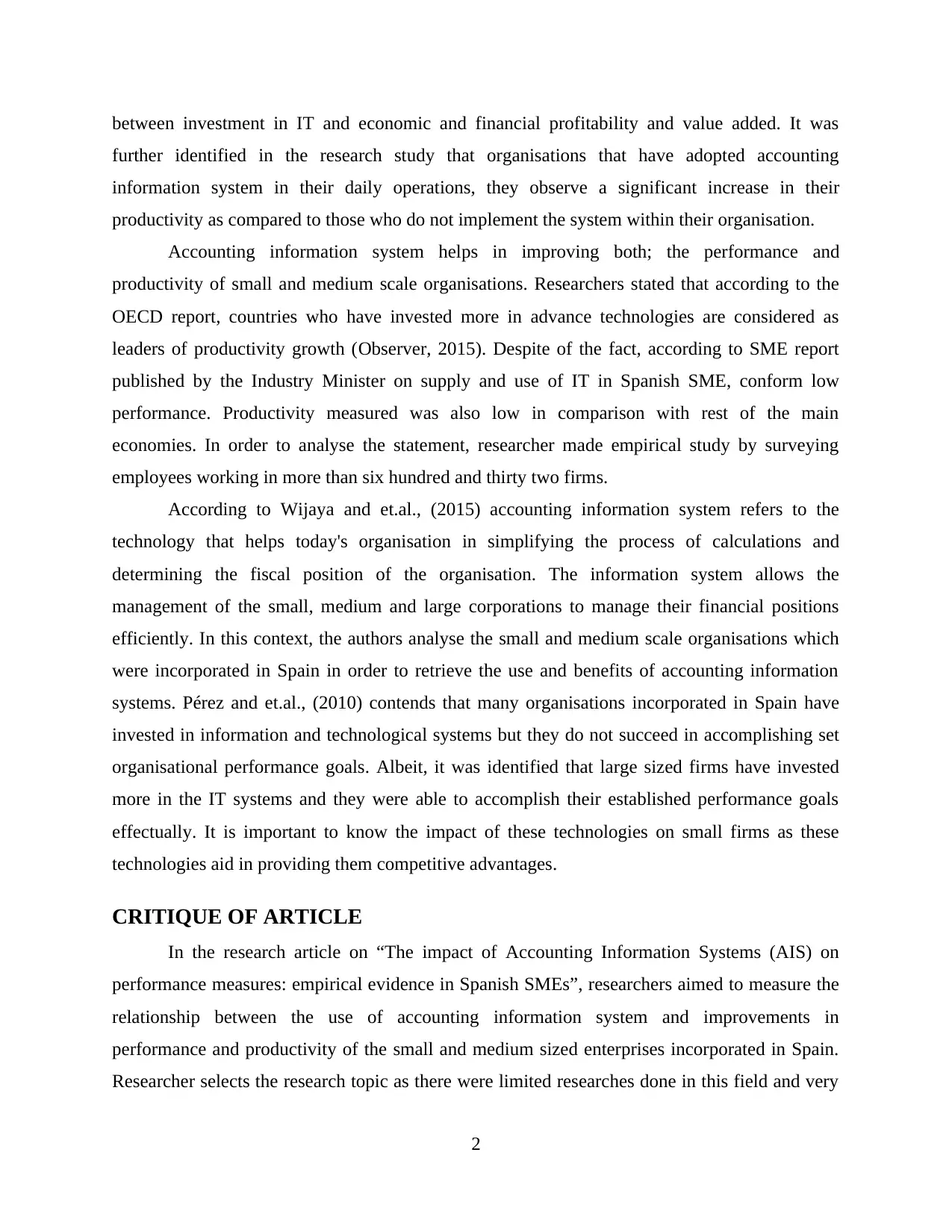
between investment in IT and economic and financial profitability and value added. It was
further identified in the research study that organisations that have adopted accounting
information system in their daily operations, they observe a significant increase in their
productivity as compared to those who do not implement the system within their organisation.
Accounting information system helps in improving both; the performance and
productivity of small and medium scale organisations. Researchers stated that according to the
OECD report, countries who have invested more in advance technologies are considered as
leaders of productivity growth (Observer, 2015). Despite of the fact, according to SME report
published by the Industry Minister on supply and use of IT in Spanish SME, conform low
performance. Productivity measured was also low in comparison with rest of the main
economies. In order to analyse the statement, researcher made empirical study by surveying
employees working in more than six hundred and thirty two firms.
According to Wijaya and et.al., (2015) accounting information system refers to the
technology that helps today's organisation in simplifying the process of calculations and
determining the fiscal position of the organisation. The information system allows the
management of the small, medium and large corporations to manage their financial positions
efficiently. In this context, the authors analyse the small and medium scale organisations which
were incorporated in Spain in order to retrieve the use and benefits of accounting information
systems. Pérez and et.al., (2010) contends that many organisations incorporated in Spain have
invested in information and technological systems but they do not succeed in accomplishing set
organisational performance goals. Albeit, it was identified that large sized firms have invested
more in the IT systems and they were able to accomplish their established performance goals
effectually. It is important to know the impact of these technologies on small firms as these
technologies aid in providing them competitive advantages.
CRITIQUE OF ARTICLE
In the research article on “The impact of Accounting Information Systems (AIS) on
performance measures: empirical evidence in Spanish SMEs”, researchers aimed to measure the
relationship between the use of accounting information system and improvements in
performance and productivity of the small and medium sized enterprises incorporated in Spain.
Researcher selects the research topic as there were limited researches done in this field and very
2
further identified in the research study that organisations that have adopted accounting
information system in their daily operations, they observe a significant increase in their
productivity as compared to those who do not implement the system within their organisation.
Accounting information system helps in improving both; the performance and
productivity of small and medium scale organisations. Researchers stated that according to the
OECD report, countries who have invested more in advance technologies are considered as
leaders of productivity growth (Observer, 2015). Despite of the fact, according to SME report
published by the Industry Minister on supply and use of IT in Spanish SME, conform low
performance. Productivity measured was also low in comparison with rest of the main
economies. In order to analyse the statement, researcher made empirical study by surveying
employees working in more than six hundred and thirty two firms.
According to Wijaya and et.al., (2015) accounting information system refers to the
technology that helps today's organisation in simplifying the process of calculations and
determining the fiscal position of the organisation. The information system allows the
management of the small, medium and large corporations to manage their financial positions
efficiently. In this context, the authors analyse the small and medium scale organisations which
were incorporated in Spain in order to retrieve the use and benefits of accounting information
systems. Pérez and et.al., (2010) contends that many organisations incorporated in Spain have
invested in information and technological systems but they do not succeed in accomplishing set
organisational performance goals. Albeit, it was identified that large sized firms have invested
more in the IT systems and they were able to accomplish their established performance goals
effectually. It is important to know the impact of these technologies on small firms as these
technologies aid in providing them competitive advantages.
CRITIQUE OF ARTICLE
In the research article on “The impact of Accounting Information Systems (AIS) on
performance measures: empirical evidence in Spanish SMEs”, researchers aimed to measure the
relationship between the use of accounting information system and improvements in
performance and productivity of the small and medium sized enterprises incorporated in Spain.
Researcher selects the research topic as there were limited researches done in this field and very
2
Paraphrase This Document
Need a fresh take? Get an instant paraphrase of this document with our AI Paraphraser
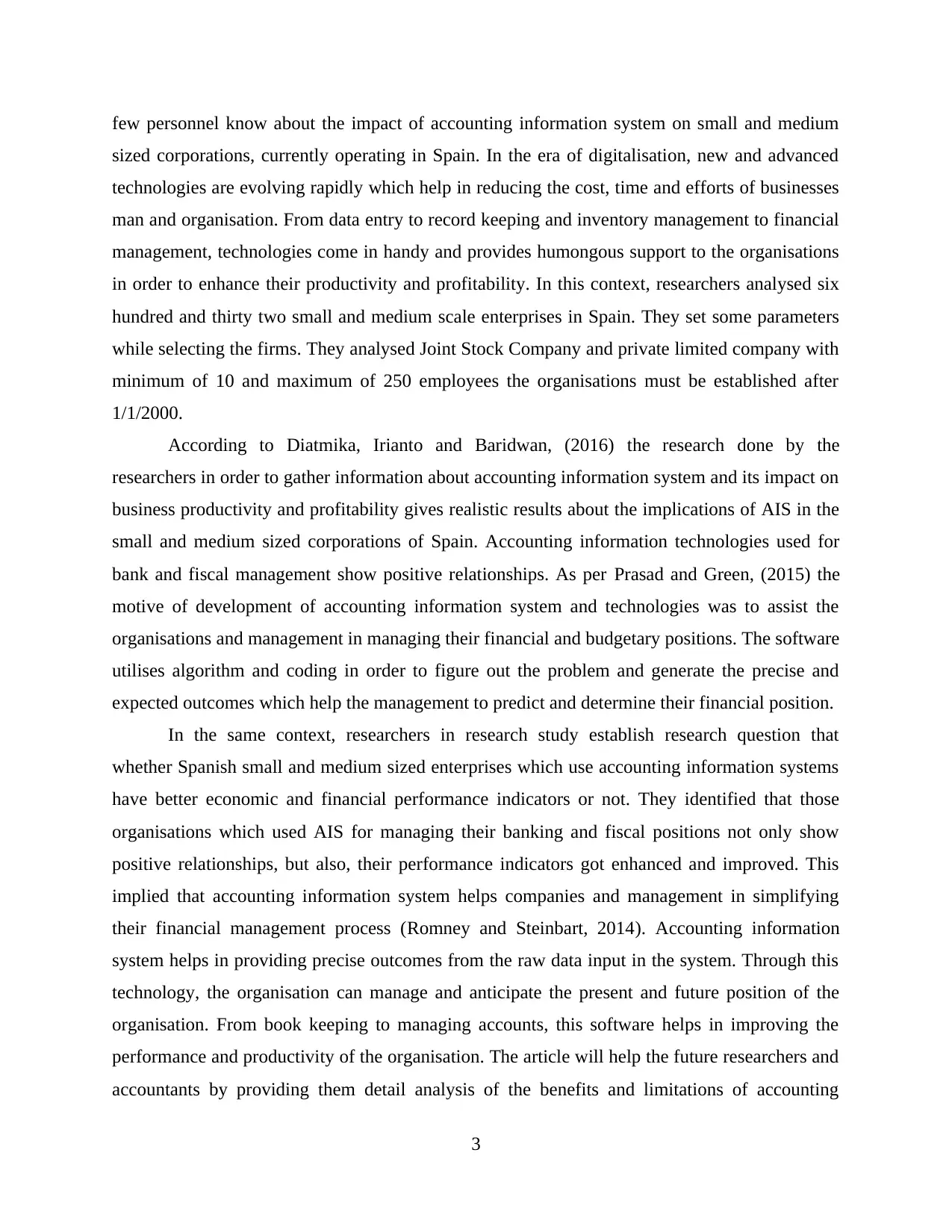
few personnel know about the impact of accounting information system on small and medium
sized corporations, currently operating in Spain. In the era of digitalisation, new and advanced
technologies are evolving rapidly which help in reducing the cost, time and efforts of businesses
man and organisation. From data entry to record keeping and inventory management to financial
management, technologies come in handy and provides humongous support to the organisations
in order to enhance their productivity and profitability. In this context, researchers analysed six
hundred and thirty two small and medium scale enterprises in Spain. They set some parameters
while selecting the firms. They analysed Joint Stock Company and private limited company with
minimum of 10 and maximum of 250 employees the organisations must be established after
1/1/2000.
According to Diatmika, Irianto and Baridwan, (2016) the research done by the
researchers in order to gather information about accounting information system and its impact on
business productivity and profitability gives realistic results about the implications of AIS in the
small and medium sized corporations of Spain. Accounting information technologies used for
bank and fiscal management show positive relationships. As per Prasad and Green, (2015) the
motive of development of accounting information system and technologies was to assist the
organisations and management in managing their financial and budgetary positions. The software
utilises algorithm and coding in order to figure out the problem and generate the precise and
expected outcomes which help the management to predict and determine their financial position.
In the same context, researchers in research study establish research question that
whether Spanish small and medium sized enterprises which use accounting information systems
have better economic and financial performance indicators or not. They identified that those
organisations which used AIS for managing their banking and fiscal positions not only show
positive relationships, but also, their performance indicators got enhanced and improved. This
implied that accounting information system helps companies and management in simplifying
their financial management process (Romney and Steinbart, 2014). Accounting information
system helps in providing precise outcomes from the raw data input in the system. Through this
technology, the organisation can manage and anticipate the present and future position of the
organisation. From book keeping to managing accounts, this software helps in improving the
performance and productivity of the organisation. The article will help the future researchers and
accountants by providing them detail analysis of the benefits and limitations of accounting
3
sized corporations, currently operating in Spain. In the era of digitalisation, new and advanced
technologies are evolving rapidly which help in reducing the cost, time and efforts of businesses
man and organisation. From data entry to record keeping and inventory management to financial
management, technologies come in handy and provides humongous support to the organisations
in order to enhance their productivity and profitability. In this context, researchers analysed six
hundred and thirty two small and medium scale enterprises in Spain. They set some parameters
while selecting the firms. They analysed Joint Stock Company and private limited company with
minimum of 10 and maximum of 250 employees the organisations must be established after
1/1/2000.
According to Diatmika, Irianto and Baridwan, (2016) the research done by the
researchers in order to gather information about accounting information system and its impact on
business productivity and profitability gives realistic results about the implications of AIS in the
small and medium sized corporations of Spain. Accounting information technologies used for
bank and fiscal management show positive relationships. As per Prasad and Green, (2015) the
motive of development of accounting information system and technologies was to assist the
organisations and management in managing their financial and budgetary positions. The software
utilises algorithm and coding in order to figure out the problem and generate the precise and
expected outcomes which help the management to predict and determine their financial position.
In the same context, researchers in research study establish research question that
whether Spanish small and medium sized enterprises which use accounting information systems
have better economic and financial performance indicators or not. They identified that those
organisations which used AIS for managing their banking and fiscal positions not only show
positive relationships, but also, their performance indicators got enhanced and improved. This
implied that accounting information system helps companies and management in simplifying
their financial management process (Romney and Steinbart, 2014). Accounting information
system helps in providing precise outcomes from the raw data input in the system. Through this
technology, the organisation can manage and anticipate the present and future position of the
organisation. From book keeping to managing accounts, this software helps in improving the
performance and productivity of the organisation. The article will help the future researchers and
accountants by providing them detail analysis of the benefits and limitations of accounting
3
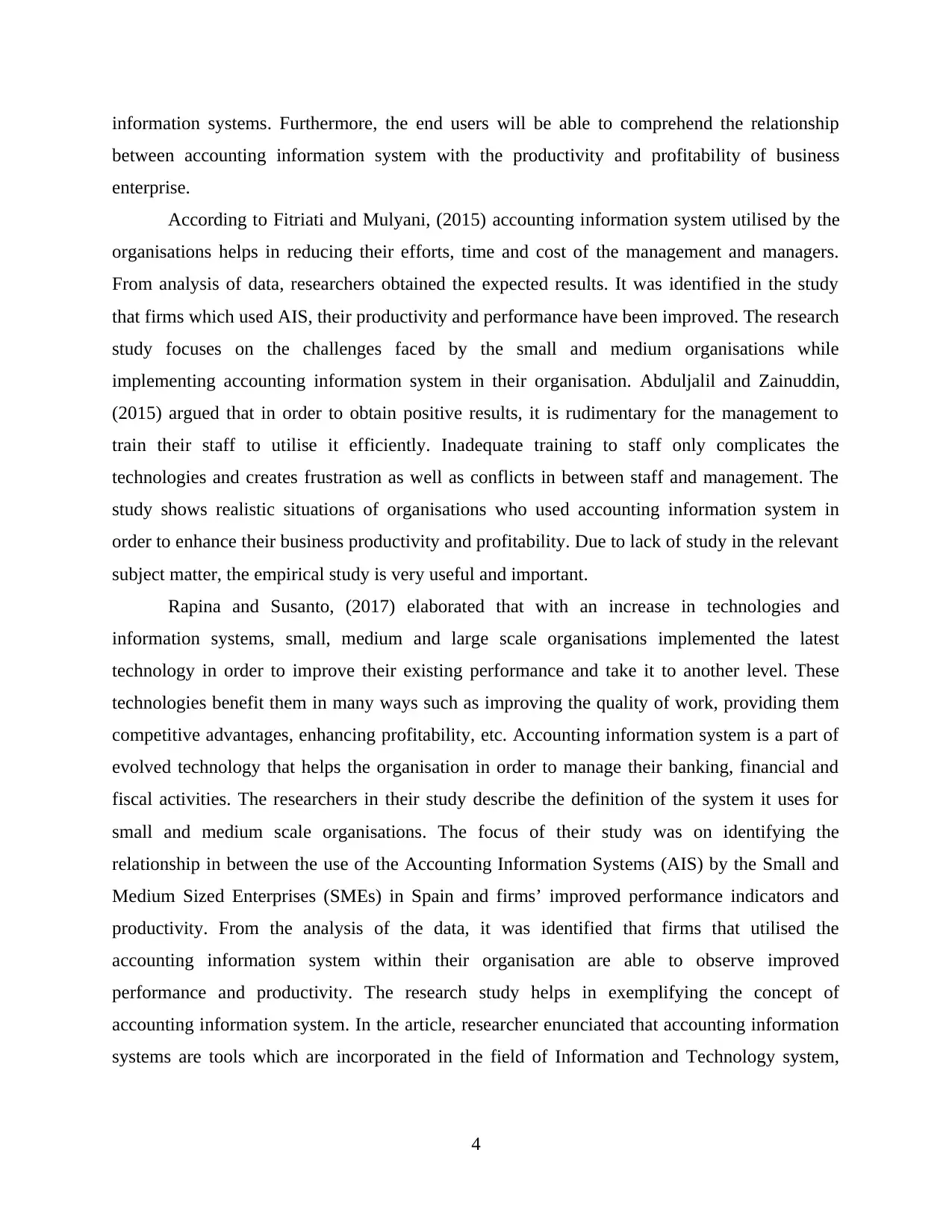
information systems. Furthermore, the end users will be able to comprehend the relationship
between accounting information system with the productivity and profitability of business
enterprise.
According to Fitriati and Mulyani, (2015) accounting information system utilised by the
organisations helps in reducing their efforts, time and cost of the management and managers.
From analysis of data, researchers obtained the expected results. It was identified in the study
that firms which used AIS, their productivity and performance have been improved. The research
study focuses on the challenges faced by the small and medium organisations while
implementing accounting information system in their organisation. Abduljalil and Zainuddin,
(2015) argued that in order to obtain positive results, it is rudimentary for the management to
train their staff to utilise it efficiently. Inadequate training to staff only complicates the
technologies and creates frustration as well as conflicts in between staff and management. The
study shows realistic situations of organisations who used accounting information system in
order to enhance their business productivity and profitability. Due to lack of study in the relevant
subject matter, the empirical study is very useful and important.
Rapina and Susanto, (2017) elaborated that with an increase in technologies and
information systems, small, medium and large scale organisations implemented the latest
technology in order to improve their existing performance and take it to another level. These
technologies benefit them in many ways such as improving the quality of work, providing them
competitive advantages, enhancing profitability, etc. Accounting information system is a part of
evolved technology that helps the organisation in order to manage their banking, financial and
fiscal activities. The researchers in their study describe the definition of the system it uses for
small and medium scale organisations. The focus of their study was on identifying the
relationship in between the use of the Accounting Information Systems (AIS) by the Small and
Medium Sized Enterprises (SMEs) in Spain and firms’ improved performance indicators and
productivity. From the analysis of the data, it was identified that firms that utilised the
accounting information system within their organisation are able to observe improved
performance and productivity. The research study helps in exemplifying the concept of
accounting information system. In the article, researcher enunciated that accounting information
systems are tools which are incorporated in the field of Information and Technology system,
4
between accounting information system with the productivity and profitability of business
enterprise.
According to Fitriati and Mulyani, (2015) accounting information system utilised by the
organisations helps in reducing their efforts, time and cost of the management and managers.
From analysis of data, researchers obtained the expected results. It was identified in the study
that firms which used AIS, their productivity and performance have been improved. The research
study focuses on the challenges faced by the small and medium organisations while
implementing accounting information system in their organisation. Abduljalil and Zainuddin,
(2015) argued that in order to obtain positive results, it is rudimentary for the management to
train their staff to utilise it efficiently. Inadequate training to staff only complicates the
technologies and creates frustration as well as conflicts in between staff and management. The
study shows realistic situations of organisations who used accounting information system in
order to enhance their business productivity and profitability. Due to lack of study in the relevant
subject matter, the empirical study is very useful and important.
Rapina and Susanto, (2017) elaborated that with an increase in technologies and
information systems, small, medium and large scale organisations implemented the latest
technology in order to improve their existing performance and take it to another level. These
technologies benefit them in many ways such as improving the quality of work, providing them
competitive advantages, enhancing profitability, etc. Accounting information system is a part of
evolved technology that helps the organisation in order to manage their banking, financial and
fiscal activities. The researchers in their study describe the definition of the system it uses for
small and medium scale organisations. The focus of their study was on identifying the
relationship in between the use of the Accounting Information Systems (AIS) by the Small and
Medium Sized Enterprises (SMEs) in Spain and firms’ improved performance indicators and
productivity. From the analysis of the data, it was identified that firms that utilised the
accounting information system within their organisation are able to observe improved
performance and productivity. The research study helps in exemplifying the concept of
accounting information system. In the article, researcher enunciated that accounting information
systems are tools which are incorporated in the field of Information and Technology system,
4
⊘ This is a preview!⊘
Do you want full access?
Subscribe today to unlock all pages.

Trusted by 1+ million students worldwide
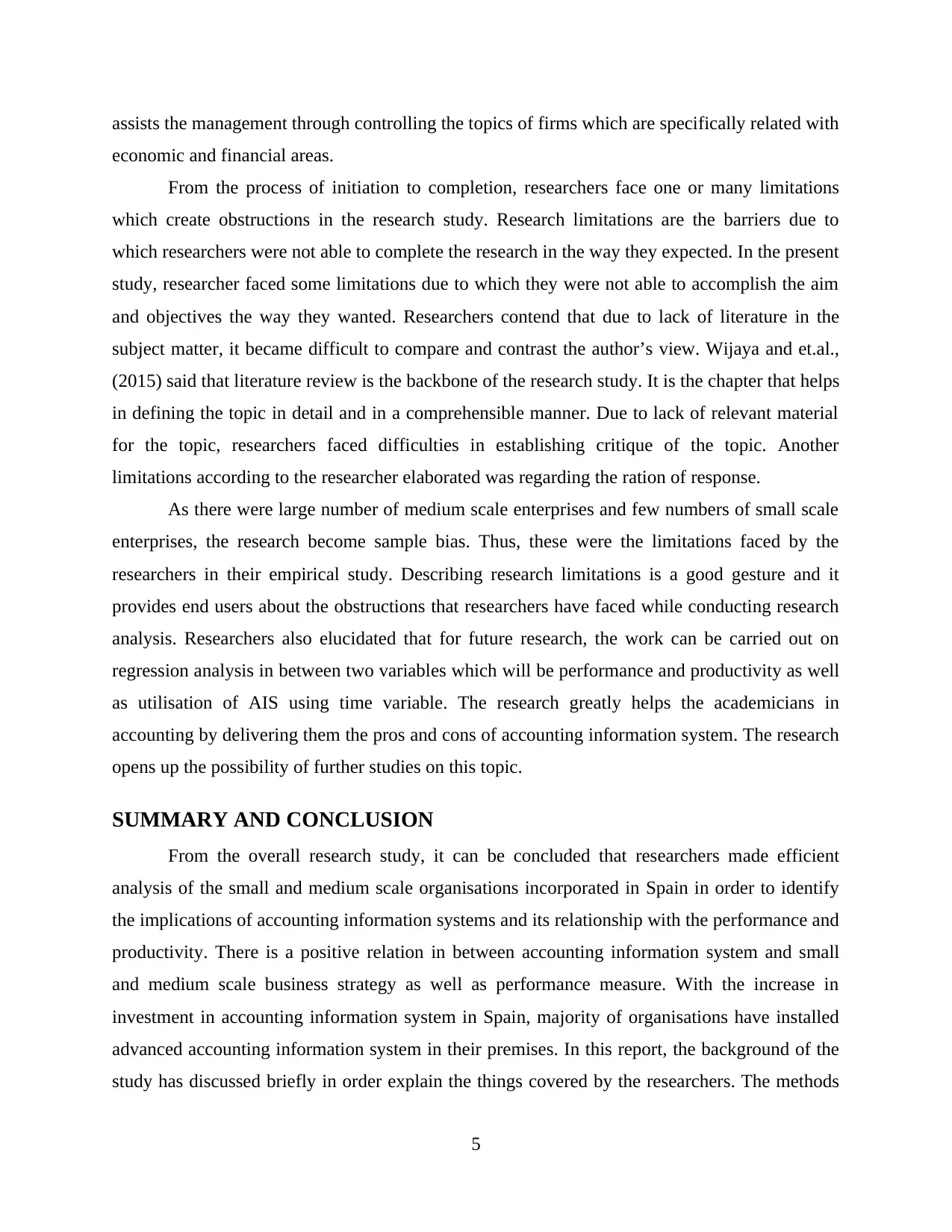
assists the management through controlling the topics of firms which are specifically related with
economic and financial areas.
From the process of initiation to completion, researchers face one or many limitations
which create obstructions in the research study. Research limitations are the barriers due to
which researchers were not able to complete the research in the way they expected. In the present
study, researcher faced some limitations due to which they were not able to accomplish the aim
and objectives the way they wanted. Researchers contend that due to lack of literature in the
subject matter, it became difficult to compare and contrast the author’s view. Wijaya and et.al.,
(2015) said that literature review is the backbone of the research study. It is the chapter that helps
in defining the topic in detail and in a comprehensible manner. Due to lack of relevant material
for the topic, researchers faced difficulties in establishing critique of the topic. Another
limitations according to the researcher elaborated was regarding the ration of response.
As there were large number of medium scale enterprises and few numbers of small scale
enterprises, the research become sample bias. Thus, these were the limitations faced by the
researchers in their empirical study. Describing research limitations is a good gesture and it
provides end users about the obstructions that researchers have faced while conducting research
analysis. Researchers also elucidated that for future research, the work can be carried out on
regression analysis in between two variables which will be performance and productivity as well
as utilisation of AIS using time variable. The research greatly helps the academicians in
accounting by delivering them the pros and cons of accounting information system. The research
opens up the possibility of further studies on this topic.
SUMMARY AND CONCLUSION
From the overall research study, it can be concluded that researchers made efficient
analysis of the small and medium scale organisations incorporated in Spain in order to identify
the implications of accounting information systems and its relationship with the performance and
productivity. There is a positive relation in between accounting information system and small
and medium scale business strategy as well as performance measure. With the increase in
investment in accounting information system in Spain, majority of organisations have installed
advanced accounting information system in their premises. In this report, the background of the
study has discussed briefly in order explain the things covered by the researchers. The methods
5
economic and financial areas.
From the process of initiation to completion, researchers face one or many limitations
which create obstructions in the research study. Research limitations are the barriers due to
which researchers were not able to complete the research in the way they expected. In the present
study, researcher faced some limitations due to which they were not able to accomplish the aim
and objectives the way they wanted. Researchers contend that due to lack of literature in the
subject matter, it became difficult to compare and contrast the author’s view. Wijaya and et.al.,
(2015) said that literature review is the backbone of the research study. It is the chapter that helps
in defining the topic in detail and in a comprehensible manner. Due to lack of relevant material
for the topic, researchers faced difficulties in establishing critique of the topic. Another
limitations according to the researcher elaborated was regarding the ration of response.
As there were large number of medium scale enterprises and few numbers of small scale
enterprises, the research become sample bias. Thus, these were the limitations faced by the
researchers in their empirical study. Describing research limitations is a good gesture and it
provides end users about the obstructions that researchers have faced while conducting research
analysis. Researchers also elucidated that for future research, the work can be carried out on
regression analysis in between two variables which will be performance and productivity as well
as utilisation of AIS using time variable. The research greatly helps the academicians in
accounting by delivering them the pros and cons of accounting information system. The research
opens up the possibility of further studies on this topic.
SUMMARY AND CONCLUSION
From the overall research study, it can be concluded that researchers made efficient
analysis of the small and medium scale organisations incorporated in Spain in order to identify
the implications of accounting information systems and its relationship with the performance and
productivity. There is a positive relation in between accounting information system and small
and medium scale business strategy as well as performance measure. With the increase in
investment in accounting information system in Spain, majority of organisations have installed
advanced accounting information system in their premises. In this report, the background of the
study has discussed briefly in order explain the things covered by the researchers. The methods
5
Paraphrase This Document
Need a fresh take? Get an instant paraphrase of this document with our AI Paraphraser
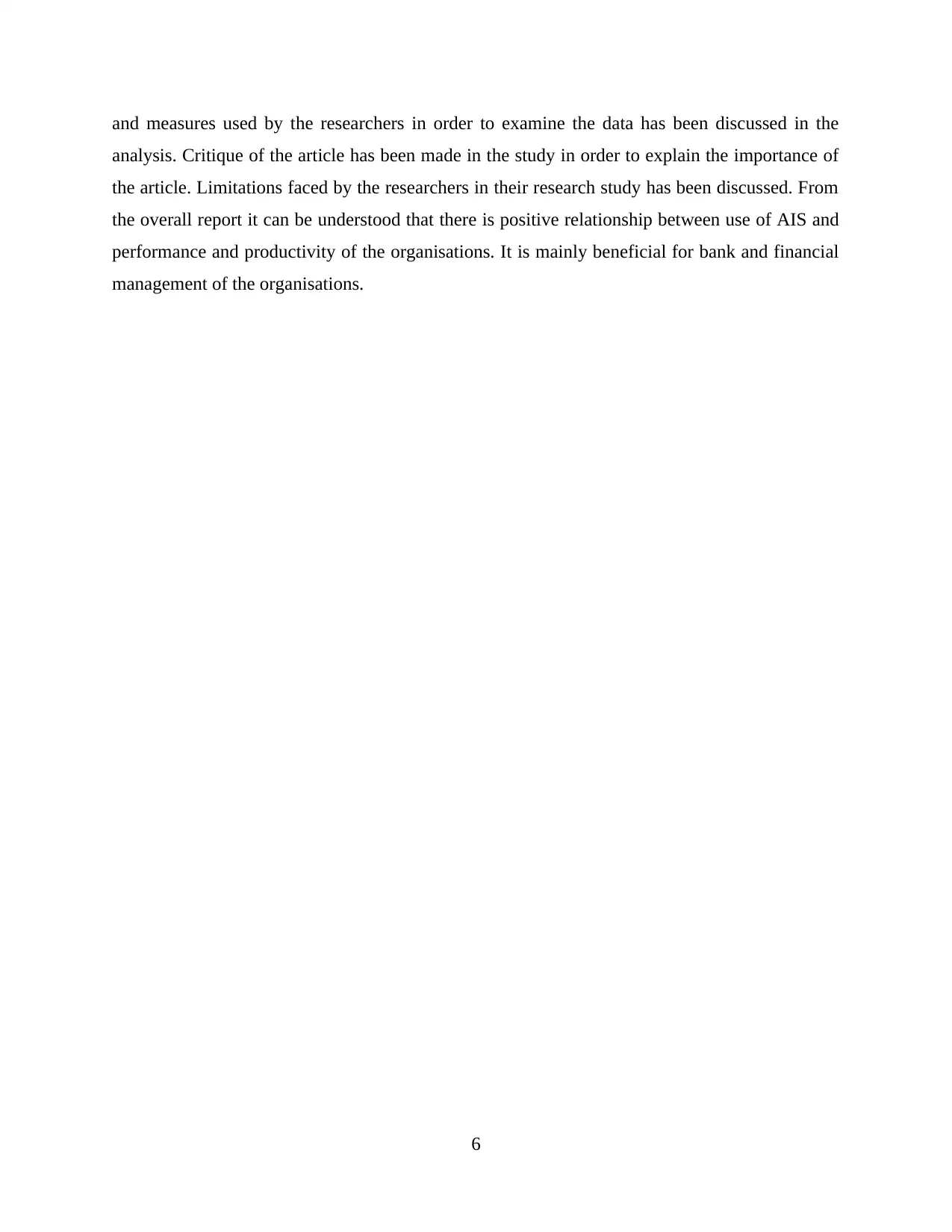
and measures used by the researchers in order to examine the data has been discussed in the
analysis. Critique of the article has been made in the study in order to explain the importance of
the article. Limitations faced by the researchers in their research study has been discussed. From
the overall report it can be understood that there is positive relationship between use of AIS and
performance and productivity of the organisations. It is mainly beneficial for bank and financial
management of the organisations.
6
analysis. Critique of the article has been made in the study in order to explain the importance of
the article. Limitations faced by the researchers in their research study has been discussed. From
the overall report it can be understood that there is positive relationship between use of AIS and
performance and productivity of the organisations. It is mainly beneficial for bank and financial
management of the organisations.
6
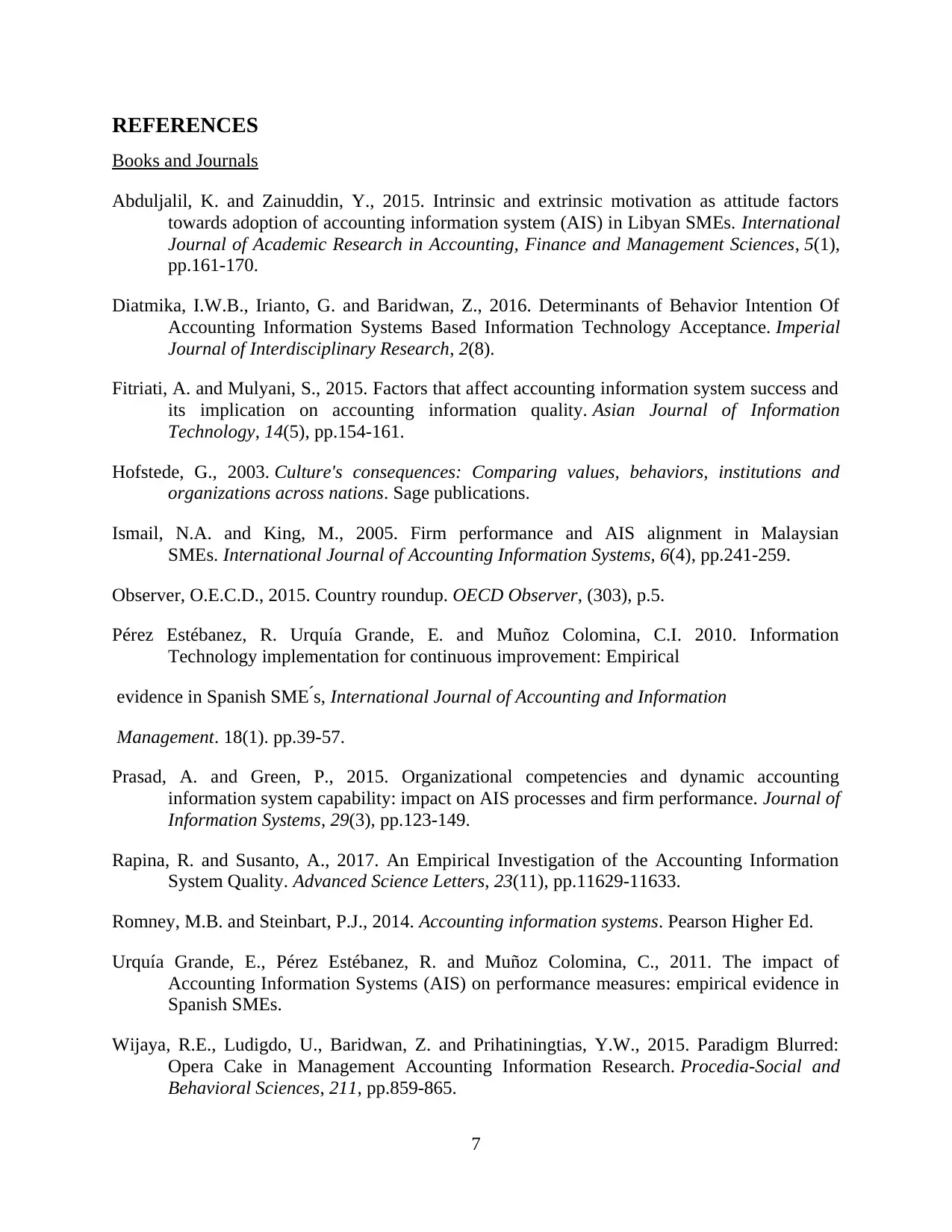
REFERENCES
Books and Journals
Abduljalil, K. and Zainuddin, Y., 2015. Intrinsic and extrinsic motivation as attitude factors
towards adoption of accounting information system (AIS) in Libyan SMEs. International
Journal of Academic Research in Accounting, Finance and Management Sciences, 5(1),
pp.161-170.
Diatmika, I.W.B., Irianto, G. and Baridwan, Z., 2016. Determinants of Behavior Intention Of
Accounting Information Systems Based Information Technology Acceptance. Imperial
Journal of Interdisciplinary Research, 2(8).
Fitriati, A. and Mulyani, S., 2015. Factors that affect accounting information system success and
its implication on accounting information quality. Asian Journal of Information
Technology, 14(5), pp.154-161.
Hofstede, G., 2003. Culture's consequences: Comparing values, behaviors, institutions and
organizations across nations. Sage publications.
Ismail, N.A. and King, M., 2005. Firm performance and AIS alignment in Malaysian
SMEs. International Journal of Accounting Information Systems, 6(4), pp.241-259.
Observer, O.E.C.D., 2015. Country roundup. OECD Observer, (303), p.5.
Pérez Estébanez, R. Urquía Grande, E. and Muñoz Colomina, C.I. 2010. Information
Technology implementation for continuous improvement: Empirical
evidence in Spanish SME ́ s, International Journal of Accounting and Information
Management. 18(1). pp.39-57.
Prasad, A. and Green, P., 2015. Organizational competencies and dynamic accounting
information system capability: impact on AIS processes and firm performance. Journal of
Information Systems, 29(3), pp.123-149.
Rapina, R. and Susanto, A., 2017. An Empirical Investigation of the Accounting Information
System Quality. Advanced Science Letters, 23(11), pp.11629-11633.
Romney, M.B. and Steinbart, P.J., 2014. Accounting information systems. Pearson Higher Ed.
Urquía Grande, E., Pérez Estébanez, R. and Muñoz Colomina, C., 2011. The impact of
Accounting Information Systems (AIS) on performance measures: empirical evidence in
Spanish SMEs.
Wijaya, R.E., Ludigdo, U., Baridwan, Z. and Prihatiningtias, Y.W., 2015. Paradigm Blurred:
Opera Cake in Management Accounting Information Research. Procedia-Social and
Behavioral Sciences, 211, pp.859-865.
7
Books and Journals
Abduljalil, K. and Zainuddin, Y., 2015. Intrinsic and extrinsic motivation as attitude factors
towards adoption of accounting information system (AIS) in Libyan SMEs. International
Journal of Academic Research in Accounting, Finance and Management Sciences, 5(1),
pp.161-170.
Diatmika, I.W.B., Irianto, G. and Baridwan, Z., 2016. Determinants of Behavior Intention Of
Accounting Information Systems Based Information Technology Acceptance. Imperial
Journal of Interdisciplinary Research, 2(8).
Fitriati, A. and Mulyani, S., 2015. Factors that affect accounting information system success and
its implication on accounting information quality. Asian Journal of Information
Technology, 14(5), pp.154-161.
Hofstede, G., 2003. Culture's consequences: Comparing values, behaviors, institutions and
organizations across nations. Sage publications.
Ismail, N.A. and King, M., 2005. Firm performance and AIS alignment in Malaysian
SMEs. International Journal of Accounting Information Systems, 6(4), pp.241-259.
Observer, O.E.C.D., 2015. Country roundup. OECD Observer, (303), p.5.
Pérez Estébanez, R. Urquía Grande, E. and Muñoz Colomina, C.I. 2010. Information
Technology implementation for continuous improvement: Empirical
evidence in Spanish SME ́ s, International Journal of Accounting and Information
Management. 18(1). pp.39-57.
Prasad, A. and Green, P., 2015. Organizational competencies and dynamic accounting
information system capability: impact on AIS processes and firm performance. Journal of
Information Systems, 29(3), pp.123-149.
Rapina, R. and Susanto, A., 2017. An Empirical Investigation of the Accounting Information
System Quality. Advanced Science Letters, 23(11), pp.11629-11633.
Romney, M.B. and Steinbart, P.J., 2014. Accounting information systems. Pearson Higher Ed.
Urquía Grande, E., Pérez Estébanez, R. and Muñoz Colomina, C., 2011. The impact of
Accounting Information Systems (AIS) on performance measures: empirical evidence in
Spanish SMEs.
Wijaya, R.E., Ludigdo, U., Baridwan, Z. and Prihatiningtias, Y.W., 2015. Paradigm Blurred:
Opera Cake in Management Accounting Information Research. Procedia-Social and
Behavioral Sciences, 211, pp.859-865.
7
⊘ This is a preview!⊘
Do you want full access?
Subscribe today to unlock all pages.

Trusted by 1+ million students worldwide
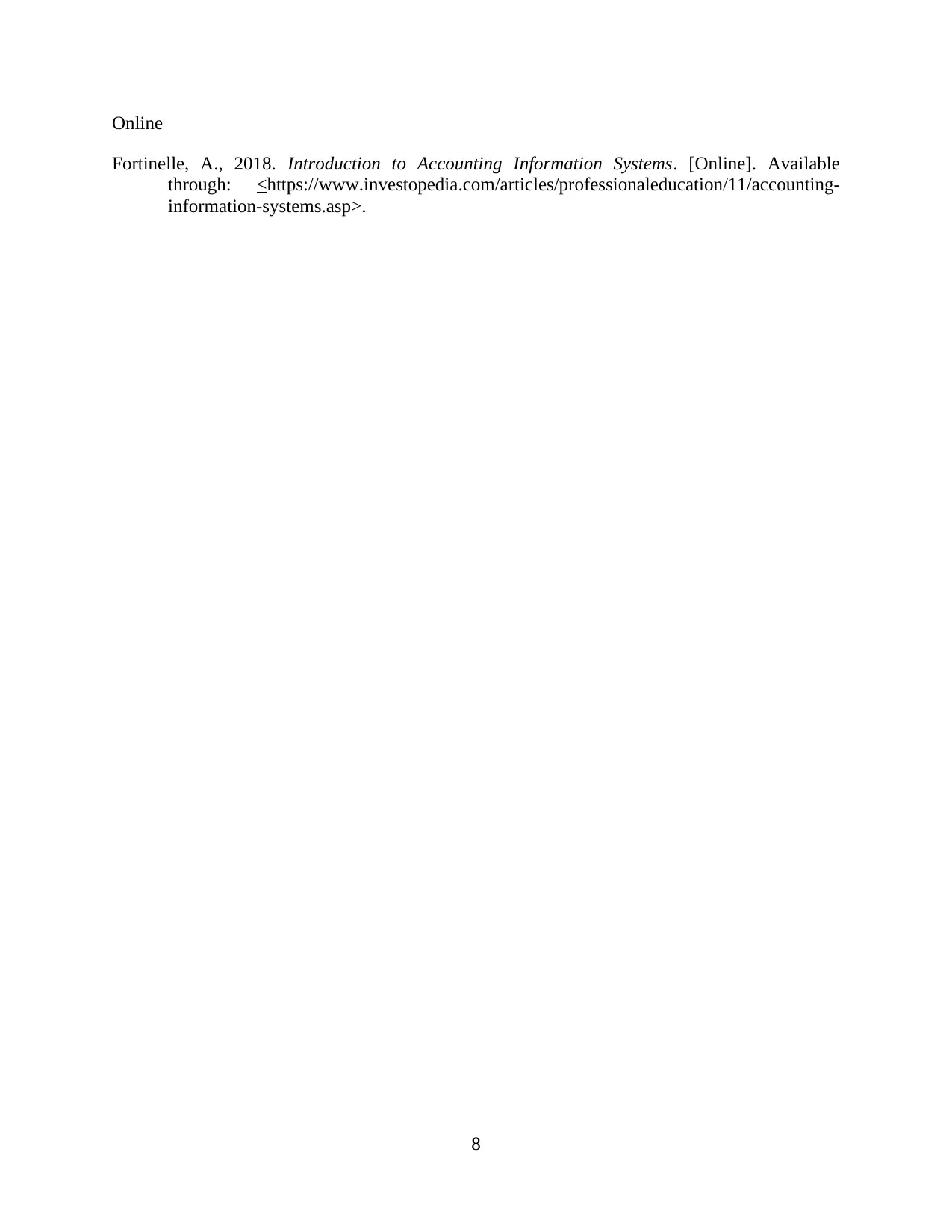
Online
Fortinelle, A., 2018. Introduction to Accounting Information Systems. [Online]. Available
through: <https://www.investopedia.com/articles/professionaleducation/11/accounting-
information-systems.asp>.
8
Fortinelle, A., 2018. Introduction to Accounting Information Systems. [Online]. Available
through: <https://www.investopedia.com/articles/professionaleducation/11/accounting-
information-systems.asp>.
8
1 out of 10
Your All-in-One AI-Powered Toolkit for Academic Success.
+13062052269
info@desklib.com
Available 24*7 on WhatsApp / Email
![[object Object]](/_next/static/media/star-bottom.7253800d.svg)
Unlock your academic potential
Copyright © 2020–2026 A2Z Services. All Rights Reserved. Developed and managed by ZUCOL.

